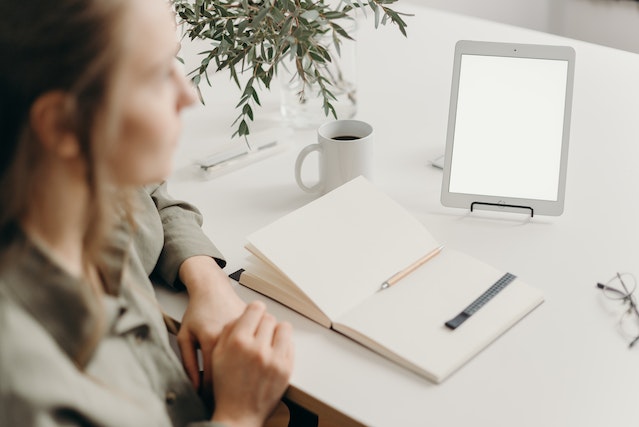It’s the age-old question: how can I become more productive? With so many distractions in life, particularly from our phones, it’s difficult to find ways to be productive that work and make a lasting difference. Read on for some key changes you can make today that can have an effective impact on how productive you are. Plus, each of these tips can be easily executed without disrupting your day-to-day life.
1. Avoid Your Phone When You Wake Up
Our phones are quite literally with us at all times. We rely on them for everything and that includes an alarm clock. It can be tempting to reach for your phone as soon as you wake up in the morning. Whether you want to check your emails, scroll social media, or take a peek at the news, it’s become part of a normal morning routine for many. Consuming content right when you wake up can lead to stress and start your day off on the wrong foot. Instead, spend some time with yourself.
“I used to be obsessed with scrolling through my phone the second I woke up, but I started to realize how anxious it made me feel”, says Yuvraj Tuli, Founder of Compound Banc. “I decided to ditch my phone the first hour of my day. I lie in bed and check-in with myself, I journal my thoughts, and I do my morning routine without my phone. I’ve found such a sense of peace in putting myself first each day and that has led me to have more productive days with my work and increased my mood. Win-win!”
2. Practice Time Blocking
Instead of creating a to-do list every day, practice time-blocking. Map out your day or week and fill in when you’ll be completing your tasks. This type of schedule doesn’t have to feel rigid, instead, it allows you to be proactive about how you’re going to complete your work promptly to give yourself more time freedom.
Brooke Castillo of the Life Coach School utilizes the Monday Hour One approach to time block her tasks. “Monday Hour One is an approach to time management that can transform not only how much you get done, but your commitment to yourself,” Brooke shared. “When we start writing down all the to-dos and all the things we want to do and all the things that we have put on the backburner. Part of Monday Hour One is bringing that all up and then asking ourselves why are we doing this, does this even matter to me? Does this make sense? Nothing will steal your dreams faster than not managing your time and not honoring your relationship with yourself.”
3. Take More Breaks
It sounds counterintuitive, but taking more breaks throughout your work day can lead you to be more productive. When you’re not prioritizing yourself during the day and giving your mind a chance to relax with a sense of calm, it can lead to burnout. Working from home, at a computer, or running from meeting to meeting all day without a break in between will leave you feeling rundown and unable to focus. So take more time out of your day for breaks, even if they’re just 10 minutes long.
“Taking multiple breaks in the workday has been a game-changer,” Natalia Morozova, Partner of Cohen, Tucker & Ades P.C. shares. “I go for a short walk around the block, call up a friend for 15 minutes, or have a drink or snack without looking at my phone or computer. Those little moments let me recharge and I come back to my desk more energized and ready to tackle the next thing.”

4. Reduce Email Check-Ins
Keeping a tab with your email open has become customary, but checking emails as they come into your inbox can throw a wrench into your productivity. Not only can they be distracting, but they can derail your current task, which could result in your work piling up.
“During the workday, I check my email once every hour,” shared Jimmy Minhas, Founder and CEO of GerdLi. “I dedicate no more than 15 minutes to my emails each hour, which leaves the remaining 45 minutes to get more work done. Now, I don’t worry about constantly checking my email and it reduced my stress and allowed me to stay focused on my work.”
5. Ditch Multi-Tasking
It might seem like multitasking is a great way to increase your productivity, but in fact, the opposite is true. When you divert your attention to more than one task, you’re not able to put your full focus on each project, which can have an adverse effect. Multi-tasking can mean you spend a long time completing a task and leaves room for more mistakes to be made.
Ryder Carroll, author of the book The Bullet Journal Method: Track the Past, Order the Present, Design the Future, explains how multitasking can prevent us from accomplishing our tasks to the best of our ability. “Inevitably we find ourselves tackling too many things at the same time, spreading our focus so thin that nothing gets the attention it deserves. This is commonly referred to as ‘being busy.’ Being busy, however, is not the same thing as being productive.”
6. Unplug More Frequently
Phones are a huge distraction and it’s easy to get sucked into content online. Aside from distracting you from other things, the constant scrolling can affect how you feel. Whatever you’re watching could make you feel anxious, unmotivated, or discouraged. This causes your productivity to plummet and you’re not able to get anything done. And that’s not just during the workday either. Constantly using your phone can prevent you from enjoying the things you love.
“So much of my downtime used to be spent on my phone,” says Colette Shelton, Founder of Chirpyest. “I didn’t think it was all that bad because I was connecting with friends and family online. But it was draining. Now, I opt for in-person interactions with my friends and family, and boy does it make a difference. I don’t find myself craving my phone. Being with a community of people fills me up in ways that I never realized could affect how productive I am in my work.”
Not so scary, right? Take these tips one step at a time to slowly ease your way into a routine that leaves you feeling more productive and gives you the time and freedom to enjoy your life.


































